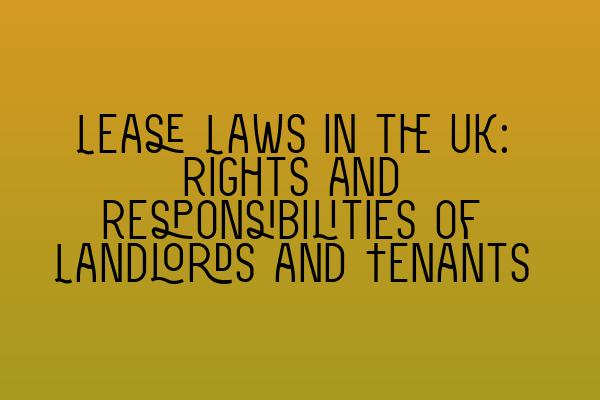Lease Laws in the UK: Rights and Responsibilities of Landlords and Tenants
Are you a landlord or a tenant in the UK? Do you know your rights and responsibilities when it comes to lease laws? Understanding the rights and responsibilities of both parties is crucial to maintain a healthy and harmonious landlord-tenant relationship. In this blog post, we will discuss lease laws in the UK and provide an overview of the rights and responsibilities of landlords and tenants.
Before we dive in, let’s define what a lease is. A lease is a legal contract between a landlord (the property owner) and a tenant (the individual or business renting the property) that outlines the terms and conditions of the rental agreement. It is important for both parties to understand and abide by these terms to avoid any disputes or legal issues in the future.
As a landlord, it is your responsibility to provide a safe and habitable property for your tenants. This includes ensuring that the property is in good repair and free from any health or safety hazards. You must also provide the necessary amenities and services as stated in the rental agreement. Additionally, landlords are responsible for maintaining the common areas of the property, such as hallways or shared gardens, if applicable.
On the other hand, tenants have a responsibility to take care of the property and use it in a reasonable manner. This means keeping the property clean, respecting the neighbors’ rights to peace and quiet, and reporting any necessary repairs to the landlord in a timely manner. Tenants are also responsible for paying rent on time and adhering to the terms of the lease agreement, such as restrictions on pets or subletting.
Now, let’s explore some specific rights and responsibilities of both landlords and tenants under lease laws in the UK:
1. Right to peaceful enjoyment: Both landlords and tenants have a right to peaceful enjoyment of the property. Landlords cannot interfere with the tenant’s right to privacy or access the property without proper notice, except in cases of emergencies. Similarly, tenants must not disturb other tenants or use the property for illegal activities.
2. Deposit protection: Landlords are required by law to protect their tenants’ deposits in a government-approved tenancy deposit protection scheme. This ensures that tenants can get their deposit back at the end of the tenancy, provided they have met the terms of the agreement.
3. Rent increases: Landlords have the right to increase the rent, but they must adhere to certain rules and regulations. Depending on the type of tenancy, they may need to provide notice and follow specific procedures. Tenants should be aware of their rights in terms of rent increases and seek advice if they believe the increase is unfair.
4. Repairs and maintenance: Landlords have a responsibility to maintain the property and carry out necessary repairs. Tenants should promptly report any issues to their landlord, who should address the problem within a reasonable timeframe. If the landlord fails to fulfill their responsibilities, tenants may have certain legal remedies available to them.
5. Termination of the tenancy: Both landlords and tenants have the right to terminate a tenancy agreement, provided they follow the correct procedures. Landlords generally have more strict requirements, such as providing notice, while tenants may have more flexibility depending on the type of tenancy.
Understanding lease laws and the rights and responsibilities of landlords and tenants is crucial for a smooth and successful tenancy. If you are unsure about any aspect of your lease agreement, it is recommended to seek legal advice to ensure you are fully informed and protected.
At SQE Property Law & Land Law, we offer comprehensive legal services for landlords and tenants in the UK. Our team of experienced solicitors can assist you with lease agreements, disputes, and any other property-related matters. Contact us today to discuss your legal needs.
—————–
We hope you found this article helpful in understanding the lease laws in the UK and the rights and responsibilities of landlords and tenants. For more in-depth knowledge and to test your understanding of contract law, we recommend checking out our interactive SQE mock tests for Contract Law: Test Your Knowledge.
If you’re interested in learning more about the rights and responsibilities of parties in a contract, be sure to read our article on Parties in a Contract: Rights and Responsibilities. You can also explore the topic of duress and undue influence in contracts by reading our article Unveiling Duress and Undue Influence in Contracts.
Furthermore, if you want to delve into the essentials of consideration, we have an article dedicated to Understanding the Backbone of Contracts: Essentials of Consideration. And if you’re curious about assessing financial compensation in the context of contract law, don’t miss our article on Damages in Contract Law: Assessing Financial Compensation.
Stay informed and empowered with our expert insights at SQE Property Law & Land Law.
